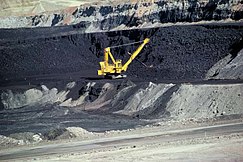Non-renewable resource
class of economic resources that natural processes do not readily replenish at practical rates
A non-renewable resource is a natural resource that is used up faster than it can be made by nature. It cannot be produced, grown or generated on a scale which can sustain how quickly it is being consumed. Once it is used up, there is no more available for the future. Fossil fuels (such as coal, petroleum, and natural gas), types of nuclear power (uranium) and certain examples. Resources such as timber (when harvested sustainably) or metals (which can be recycled) are considered renewable resources.[1] Non-renewable resources are also called exhaustible resources.

The renewable energy is the contrary notion.
References
changeOther websites
change- Non-Renewable Resources Archived 2014-03-30 at the Wayback Machine at NASA.gov
- Electricity from Non-Hydroelectric Renewable Energy Sources at EPA.gov
- Non-renewable energy resource Archived 2008-05-03 at the Wayback Machine at EPA.gov
- Environmental impacts of nuclear power at EPA.gov